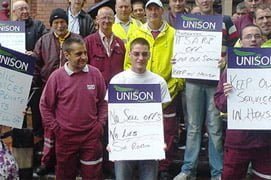UNISON’s
425,000 members in Health have voted to accept the Government’s 3 year pay
deal, which will deal a significant blow to the chances of a generalised
campaign on pay across the public sector this summer. The deal offers 8.1% over
three years, with more for some members. The union’s position was explained by
Karen Jennings head of Service:
“The
2.75% on offer this year is the best in the public sector and the three-year
deal offers stability. However, the rising costs of everyday items such as
food, fuel and energy obviously make members wary about being locked into a
three-year deal.”
"That is why we negotiated a reopener clause that we will not hesitate to
trigger if inflation continues to rise.”
"We know that a number of small health unions have voted against accepting
the offer and we will be making it a priority to meet with them and discuss a
way forward."
Effectively
this vote together with the recent decision of the RCN to accept means the end
of the pay campaign in health this year. But it’s clear that holding the line
over pay in the health service has been a struggle. The three year deal has
gone through with a range of sweeteners and it’s clear that the government have
sought to at least try and sweeten the pay restraint medicine.
The
union press release goes on to say:
“The
offer gives:
- 2.75% in the first year;
- a headline increase of 2.54% in
the second year, while also introducing a new minimum wage of £6.77 an
hour for all NHS staff – 18% higher than the statutory minimum wage and
meaning that those on the lowest pay point will receive an increase of
5.7%; - in the third year, the proposed
deal gives 2.5%. It includes a flat rate increase of £420 (worth 3.17% at
the lowest point) for the bottom three grades; - nurses, midwives and paramedics
on the main grade 5 and the bottom of grade 6 will receive extra money on
top of the basic increase from the second year, to recognise that more
than a quarter have reached their pay ceiling/
The
two-thirds ‘Yes’ vote in the ballot represents a solid vote for acceptance in
the most representative test of opinion across the NHS workforce, as a result
of a full postal ballot of the union with the largest membership across all
grades and professions.
UNISON negotiators also point out that the package represents the best deal in
the public sector, 8.1% over the years, and up to 10.5% for entry-grade
professionals with a new minimum hourly wage of £6.77.
But the union also recognises that a third of members in the ballot voting
against the package reflects the anxiety felt about increasing food and fuel
prices.
The union warned the government that UNISON members will not tolerate a
below-inflation increase next year, and if inflation continues to go up rather
than down, UNISON will trigger the reopener clause for year two.
Members can expect to see the money from this pay rise in their pay packets in
July.”
For
activists in UNISON and in the other health unions this, however, is only part
of the story. The truth is that the UNISON leadership have consciously avoided
making a recommendation on the offer, as the last two paragraphs from the
motion agreed at the UNISON health conference make abundantly clear:
“Conference
believes that all UNISON members working in health affected by this pay
proposal should be given a say on whether to accept or reject this proposed
agreement. Further that, if it were rejected, members would have to be prepared
to take lawful industrial action to secure a higher award for either a single
year or a multi-year agreement.
Conference
therefore calls upon the SGE to hold a ballot in May 2008 of UNISON members
working in Health who are affected by this proposal, to ask them whether they
wish to accept or reject the proposed agreement.”
If
leadership is the art of analysing the situation, explaining the options and
the organising to lead the fight, then in this case it is clearly lacking. At
the very least the union should have fought for a straightforward one year
inflation proof pay rise for all staff. In addition, although the agreement
covers the question of reopening negotiations if inflation rises above the
anticipated level, many UNISON stewards and branch officers will no doubt be
taking the line that “we’ll believe it when we see it”. Leadership is a vital
component of a successful union and of any successful struggle.
This year
was a marvellous opportunity for the leadership of UNISON and the other public
sector unions to campaign widely across the whole of the public sector to
combat low pay. This result won’t help to develop that struggle. We need a
leadership worthy of the members.






